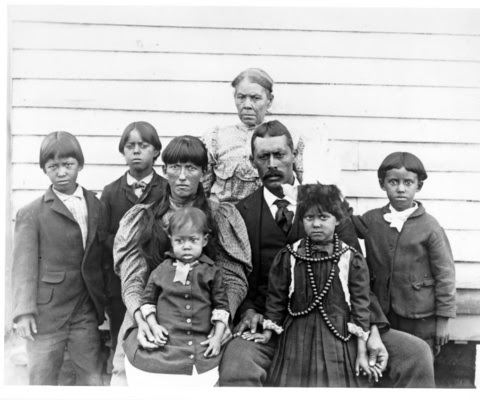Who are the Melungeons? The answer is not simple. In fact, nobody seems to know exactly.
Wikipedia states, "Melungeons (/məˈlʌndʒən/ mə-LUN-jən) is a term for numerous 'tri-racial isolate' groups of people of the Southeastern United States. Historically, the Melungeons were associated with settlements in the Cumberland Gap area of central Appalachia, which includes portions of East Tennessee, Southwest Virginia, and eastern Kentucky. Tri-racial describes populations thought to be of mixed European, African and Native American ancestry. Although there is no consensus on how many such groups exist, estimates range as high as 200."
 A typical Melungeon in Appalachia
A typical Melungeon in Appalachia
Different claims about Melungeon origins have been made but none seem to be proven. According to an article by Elizabeth Caldwell Hirschman preserved in Archives.com:
"The original definition of Melungeon referred exclusively to one tri-racial group; the descendants of Collins and Gibson and other related families of Newman's Ridge, and the Vardy Valley in Hancock County, Tennessee. Alternate DNA research supports additional ancestries: Semitic , Turkish and Moorish. Some theories speculate that the Melungeons were descended from Spanish or Portuguese explorers, shipwrecked sailors, or even from the "Lost Colonists" of Roanoke Island in Virginia. In the past, self-described Melungeons have referred to themselves as "Indians" or "Portuguese." Most of the white neighbors considered the Melungeons as a mixture of black and Indian, or white, black and Indian."
Whatever the origins, the Melungeons are a rather large group and many people in Appalachia claim to have Melungeon ancestry. However, when these people start to research their family trees, they usually find roadblocks after going back 100 years or a bit more.
The same article claims:
"Melungeons were mainly isolated in the Appalachian mountains of Northeastern Tennessee. The Melungeons found themselves caught in the middle; they were neither white nor black; but they were free. Nevertheless, they suffered discrimination, in varying levels, because of the color of their skin. The hills of Tennessee provided a place for them to live freely without the adverse criticism of the colonies and the plantation owners. It seems as though they could upgrade their status through their appearance and being a good citizen. Many fought in the Civil War on the Union side, a few on the Confederate side and some became slave owners."
 A Melungeon family in the early 20th century
A Melungeon family in the early 20th century
Even DNA analysis does not prove the origins of the Melungeons. Many DNA tests have been administered and the list of ancestral origins of those tested includes most all of Europe, the Middle East, and many widely dispersed locations in Africa.
You can learn more about Melungeons in the same article mentioned earlier: Melungeon Genealogy by Elizabeth Caldwell Hirschman published at https://www.archives.com/genealogy/family-heritage-melungeon.html. The article also lists many common Melungeon surnames: The obviously Irish name Collins, the English name Gibson, and other names of unknown origins: Powell, LeBon, Bowling, Bunch, Goins, Goodman, Heard, Minor and Mullins.
You can also find many more articles about Melungeons by searching for the word on your favorite search engine.
One of my favorite topics is the accents of Melungeons and many others in Appalachia. Is the unique Appalachian dialect the preserved language of Elizabethan England? Left over from Scots-Irish immigrants? Or something else altogether? The accents are not limited to Melungeons. Instead, the speech patters have been found throughout Appalachia.
Make sure your computer's loudspeakers are working, and then go to The Legendary Language of the Appalachian “Holler” at https://daily.jstor.org/the-legendary-language-of-the-appalachian-holler/.
You can also watch many videos about Melungeons on YouTube by starting at: https://www.youtube.com/results?search_query=melungeon.